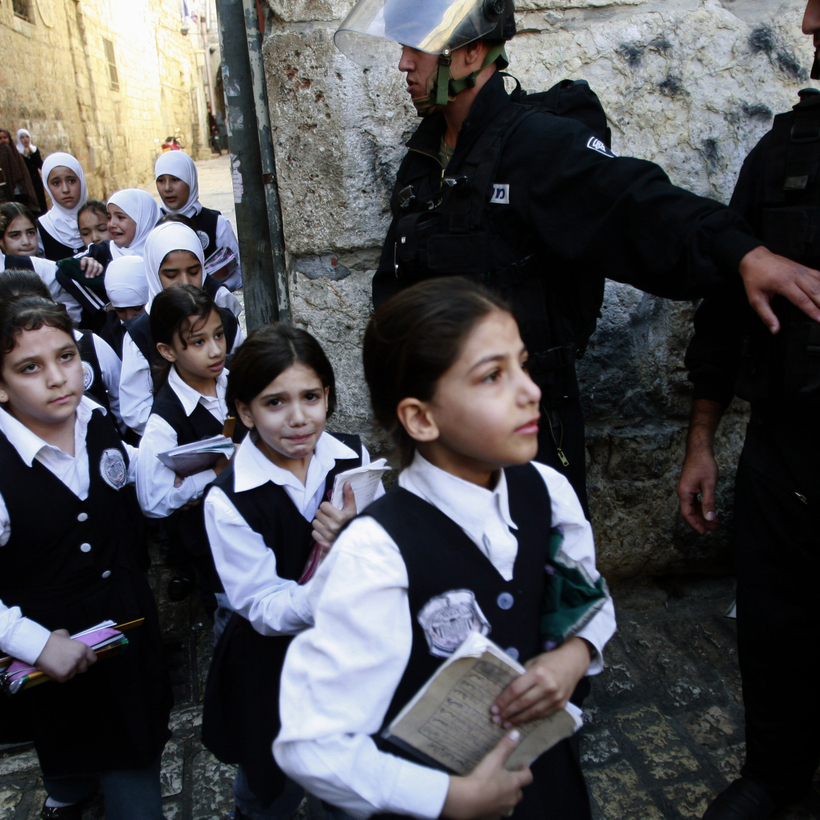Since the publication of Let the Great World Spin—the 2009 National Book Award winner for fiction—it’s been no secret that Colum McCann is one of the most compassionate writers alive, but, wow: his new book not only enters the hearts and minds of all its characters; it also validates my faith in the novel as a relentlessly resourceful and powerful form. Apeirogon is a wrenching and repetitive book, structurally inventive, made up of a thousand and one sometimes tiny, Borgesian chapters that discuss everything from, well, Borges and The Arabian Nights to Einstein, Freud, mathematics, and the migratory patterns of birds.
At its core, this is a fierce and brave rendering of the Middle East crucible from numerous angles, ergo McCann’s title: Apeirogon, “a shape with a countably infinite number of sides.” The story snaking through all these musings on the history of the world is based on the real-life friendship of two men: Bassam Aramin, a Palestinian who as a teenager spent seven years in an Israeli prison, and Rami Elhanan, a Jewish veteran of three wars and a self-described “graduate of the Holocaust.” This unlikely pair are brought together in passionate alliance by the weariness of living in a perpetual war zone when Rami joins “Combatants for Peace,” a group Bassam formed. We learn that, by the cruelest twist of fate, each man had a young daughter who was murdered by the other side.
Smadar and Abir
Rami’s “princess,” Smadar, was blown up by suicide bombers in 1997 at the age of 13 while walking down a crowded Jerusalem street on her way to buy schoolbooks with her girlfriends. According to some witnesses and a surviving shard of a shattered Walkman, the kids were giggling and listening to Sinéad O’Connor sing “Nothing Compares 2 U,” a song Smadar loved to dance to. A decade later, Bassam’s 10-year-old Abir (the name means “fragrance” in Arabic) was shot in the back of her head by an Israeli soldier with “an American-made rubber bullet” from “an American-made M-16.” Abir had just bought a candy bracelet near her school—in other words, both girls were kids being kids when they were assassinated. Abir died in the same hospital where Smadar was born, with Rami, already a friend at this point, by Bassam’s side. Engulfed by grief, the men made it their life’s work to tell their stories again and again, together, to audiences all over the world.

Depending on who is involved, this situation could pour kerosene on an already burning fire, or provide all the ingredients for a sentimental, feel-good tale about love winning out. But of course nobody wins—the men have lost before we even meet them—and while there is plenty of love between Rami and Bassam, McCann deftly elides sentiment. Instead, in Apeirogon, he conveys life’s hard truths effectively and indelibly, shedding new light upon what is both unthinkable and also now frighteningly ordinary—we kill our neighbors’ children every day.
Nobody wins—the Israeli and the Palestinian have lost before we even meet them.
In separate but equally visceral scenes, each father relives the moment of viewing the dead body of his slain daughter. The latter sections were so painful to take in, they reminded me of my experience reading Colson Whitehead’s The Underground Railroad; I had to keep putting the book down to gather the strength to go on. By repeating their stories, both Bassam and Rami, and also McCann, get to the heart of grief itself, its agonizing tenacity, and the unbearable tedium of its cruelties.
What is so fascinating about the structure of this book is that while it is crucially concerned with the tragedies of the Middle East, it ties us in to the enduring history of hate, fear, and intimidation throughout the ages—and across countries and regions—up to the present day. In a cultural moment where the question of who-has-a-right-to-what-story is argued all the time, McCann validates my belief in the writer’s right to go where his obsessions and imagination take him, and, as in this work of fiction studded with fact, to produce myriad, penetrating rays of truth.
At the novel’s center, McCann quotes directly from both men. “I still sit in that ambulance every day. I keep waiting for it to move. Every day she gets killed again,” Bassam says. “In his lectures Rami told the audience that there wasn’t a minute of his waking life—not a single minute—that he did not dwell on Smadar.” McCann feels his characters’ loss in the liquid in his bones, just as he recognizes that for the Jews and the Palestinians the choice is stark: endless war or lasting peace. Remarkably, some of the blueprint for how to get to the better of those options is built into his pages.
Helen Schulman is the author of several novels including, most recently, Come with Me


